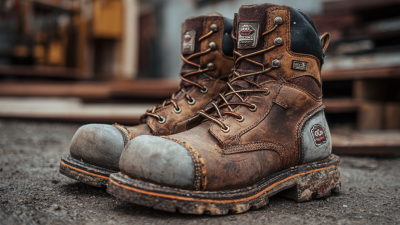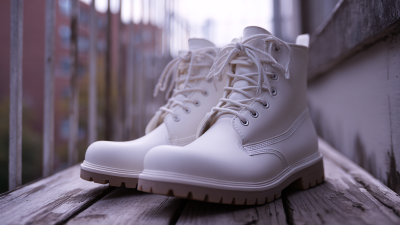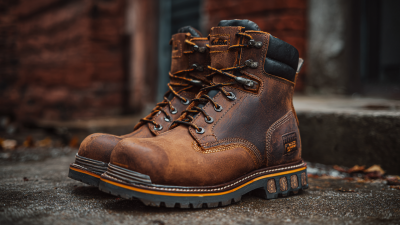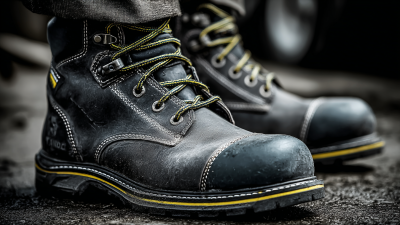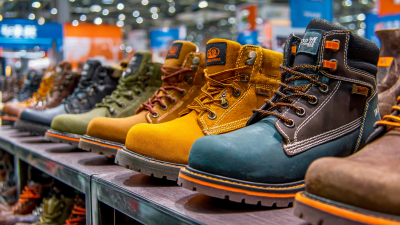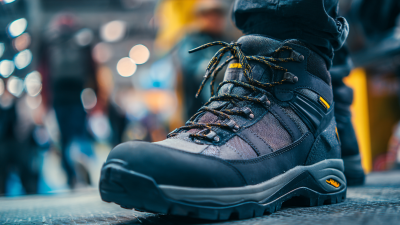The food industry is one of the most challenging and demanding sectors when it comes to workplace safety. According to the U.S. Bureau of Labor Statistics, nearly 25% of all workplace injuries in the food processing sector are related to slips, trips, and falls. These statistics underscore the critical importance of protective equipment, particularly "Food Industry Safety Shoes." These specialized shoes are designed not only to reduce the risk of accidents but also to ensure compliance with industry safety regulations, ultimately promoting employee wellbeing.
In the arena of food safety, the footwear worn by workers can significantly impact hygiene standards and overall workplace safety. A report from the National Safety Council indicates that the proper use of safety footwear can decrease workplace injuries by up to 75%. This highlights the essential role that Food Industry Safety Shoes play in safeguarding employees from hazards such as sharp objects, slippery surfaces, and electrical dangers, which are prevalent in food production environments. By investing in quality safety shoes, employers can create a safer work environment, fostering a culture of safety and health that is integral to the food industry.

In the food industry, workplace safety is paramount, and safety shoes play a crucial role in protecting employees from various hazards. According to the Occupational Safety and Health Administration (OSHA), nearly 25,000 slip and fall accidents occur in the workplace each year. These incidents can lead to severe injuries, especially in environments like kitchens and processing plants where wet and slippery conditions are prevalent. By investing in specialized safety footwear, employers can significantly reduce the risk of slips, trips, and falls, ultimately enhancing employee wellbeing.

Moreover, safety shoes in the food industry are designed to withstand specific challenges. A study by the National Institute for Occupational Safety and Health (NIOSH) highlights that over 60% of workers in food processing face potential foot injuries due to heavy equipment and falling objects. Safety shoes equipped with steel toes and slip-resistant soles provide essential protection against these dangers. Additionally, such footwear can help prevent fatigue from prolonged standing, contributing further to the overall health and productivity of the workforce. Prioritizing safety shoes is not just a regulatory requirement but a vital investment in the wellbeing of employees in the food industry.
Effective safety shoes are crucial in the food processing industry, where workers are exposed to various hazards including slippery floors, heavy equipment, and hazardous materials. A well-designed safety shoe should feature slip-resistant soles to prevent accidents related to spills, which are common in food processing environments. These soles should provide excellent traction to help employees maintain stability, even in wet conditions.

In addition to slip resistance, safety shoes for the food industry must be made from waterproof and easy-to-clean materials. This ensures that any contaminants can be quickly and effectively removed, keeping the workplace hygienic. Furthermore, shoes should offer adequate arch support and cushioning to enhance comfort during long hours of standing or walking. Protective toe caps, often made from composite or steel, provide an essential defense against heavy falling objects, ensuring both safety and assurance for employees' wellbeing in demanding environments.
Safety shoes play a crucial role in ensuring employee health and comfort, particularly in the food industry where environmental hazards abound. These specialized footwear designs incorporate features such as slip-resistant soles, reinforced toes, and supportive insoles, which directly contribute to reducing the risk of accidents and injuries. By providing a stable and secure base, safety shoes help prevent slips, trips, and falls, common occurrences that can lead to serious injuries among workers who are constantly moving in fast-paced settings.
Moreover, the comfort level of safety shoes is essential for employee wellbeing, especially during long working hours. Shoes that are ergonomically designed not only alleviate foot fatigue but also improve posture, which can lead to reduced back and joint pain. When workers feel comfortable, their overall productivity and job satisfaction increase, fostering a more positive workplace environment. Investing in quality safety shoes signifies a commitment to employee health, as they empower workers to perform their tasks efficiently without the added worry of physical discomfort or health risks.
In the food industry, regulatory standards for safety footwear are critical to maintaining a safe working environment. According to the
Occupational Safety and Health Administration (OSHA), slips, trips, and falls account for a significant percentage of workplace injuries, particularly in food processing and service sectors. The establishment of safety standards, such as
ASTM F2413, ensures that footwear provides adequate protection against these hazards. Safety shoes must feature slip-resistant soles and puncture-resistant materials, reducing the risk of injuries related to sharp objects and slippery surfaces.
Moreover, the
Food and Drug Administration (FDA) emphasizes the importance of hygiene in food environments, which extends to the footwear worn by employees. Safety shoes made from materials that can easily be cleaned and are resistant to chemicals help maintain sanitary conditions, thus preventing contamination. Industry reports indicate that properly implemented safety footwear programs can
reduce injury rates by up to 50%, not only protecting employees but also enhancing overall workplace wellbeing. Adhering to these regulatory standards is essential for any food-related business aiming to foster a culture of safety and compliance while protecting its most valuable asset—its workforce.
When selecting safety footwear for employees in the food industry, it's critical to understand that one-size-fits-all is not an appropriate approach. The diverse working environment necessitates footwear that accommodates various needs based on individual job roles and potential hazards. For instance, employees working in wet areas might require shoes with enhanced slip-resistant properties. According to the Center for Disease Control, slips, trips, and falls are among the leading causes of workplace injuries, mandating specialized footwear to mitigate these risks.
In recent developments, new ASTM standards for slip-resistant safety footwear have been introduced, which aim to provide better grip and stability, enhancing employee safety. Research indicates that workplace injury rates in retail sectors were notably high, surpassing even those in construction, emphasizing the need for effective safety measures in diverse environments. As advancements in materials and designs continue, employers are now able to provide not only protective but also comfortable footwear, ensuring that employees can perform their duties effectively while minimizing their risk of injury.
| Criteria | Importance | Recommended Features | Example Materials |
|---|---|---|---|
| Slip Resistance | Prevents slips and falls | Rubber outsole, tread patterns | Vulcanized rubber, EVA |
| Steel Toe Protection | Protects against heavy objects | Steel or composite toe caps | Steel, aluminum, Kevlar |
| Water Resistance | Keeps feet dry in wet conditions | Waterproof upper materials | Leather, synthetic membranes |
| Comfort and Fit | Reduces fatigue during long shifts | Cushioned insoles, ergonomic design | Memory foam, breathable fabrics |
| Durability | Long-lasting protection | Reinforced stitching, high-quality materials | Full-grain leather, nylon |
